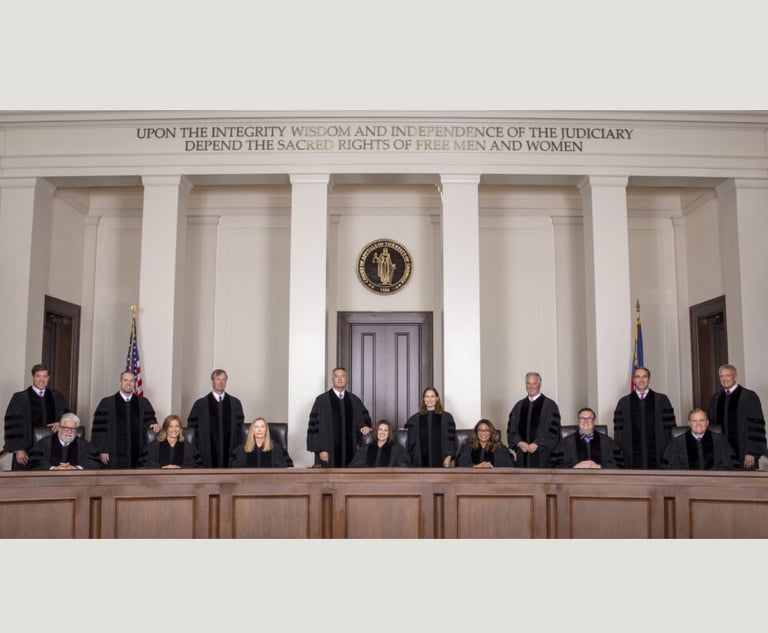 Kent Alexander (left) and Kevin Salwen. (Courtesy photo)
Kent Alexander (left) and Kevin Salwen. (Courtesy photo)Lawyer and His Co-Writer Capture Richard Jewell's Drama
Atlanta's former U.S. attorney and his co-writer, who was with the Wall Street Journal during the 1996 Atlanta Olympics, offer many can't-make-this-stuff-up anecdotes about the bombing investigation and its coverage.
December 06, 2019 at 01:44 PM
6 minute read
Richard Jewell confessed to his criminal defense lawyer in their first meeting.
Suspected by the FBI of planting a murderous bomb during the 1996 Atlanta Olympics and hounded by the global news media, Jewell unburdened his conscience to Atlanta death penalty attorney Jack Martin: "Sir, I haven't filed my taxes in two years."

Martin realized the earnest security guard couldn't be hiding a capital crime, according to authors Kent Alexander and Kevin Salwen in "The Suspect." Their account of how Jewell came to discover the bomb while patrolling a concert at Centennial Olympic Park, only to become the target of the federal investigation and the center of a news hurricane, offers many more can't-make-this-stuff-up anecdotes.
The book, which is peppered with appearances of current legal notables such as Merrick Garland, Sally Yates and David Nahmias, also serves as something of an antidote to the years of heated civil litigation between Jewell and The Atlanta Journal-Constitution.
Alexander was the U.S. attorney in Atlanta, and Salwen led the Wall Street Journal's Southeast section during the Olympics. They rely on deep reporting, including 187 interviews, to tell the stories of Jewell, along with Don Johnson, a determined FBI agent on the bombing investigation, and Kathy Scruggs, the colorful AJC reporter who first reported Jewell was a suspect.
Although the federal investigation was managed largely from the top of the FBI and the U.S. Department of Justice, it was Alexander who four months after the bombing delivered Martin a letter declaring that Jewell was no longer a target of the probe.
Alexander's inside role made him cautious about writing the book, but he told the Daily Report, "We made that a nonissue by telling the story according to others," save for memories backed by his personal journal.
Alexander said he was interested in writing the story while he was in the middle of it, but it wasn't until nearly six years ago that he started tackling it and teamed with Salwen. During the intervening years, Alexander served in a host of top in-house counsel jobs, including leading the legal department at Emory University.
Salwen, whom Alexander had approached for advice on writing the book, said the question that fueled his interest in the story was, "How did things go so horribly wrong?"
Indeed, while the government was focused on Jewell, Eric Robert Rudolph was free. "The Suspect" recounts how in the two years after the Olympics, Rudolph bombed an abortion clinic and a lesbian nightclub in Atlanta and then an abortion clinic in BIrmingham, Alabama—killing a police officer—before disappearing for five years in the North Carolina wilderness. After his discovery and arrest, Rudolph in 2005 pleaded guilty to the crimes and was sentenced to life in prison.
Meanwhile, Atlanta lawyer Lin Wood led Jewell to defamation settlements with the likes of NBC, CNN and the New York Post, based on their coverage of Jewell's time as a suspect.
But the Atlanta Journal-Constitution, represented by Peter Canfield and Tom Clyde, successfully fought Jewell's claims during 14 years of legal trench warfare, arguing that it had reported accurately that Jewell was suspected by the FBI–even if the FBI was looking at the wrong man. "The Suspect" illustrates how contentious that litigation became, relying in part on the Daily Report's article about a deposition that devolved to the point of Wood spewing four-letter words at his opponents. (In their acknowledgements, the authors kindly thank me for providing some of our archived articles for their research and credit our reporting.)
The intensity of Jewell's case against the newspaper was so palpable that, as one of many Daily Report journalists who covered it over the years, I found "The Suspect" to be a gratifying read. The 359 pages were a balm to the dozens of briefs and tough conversations aimed at scoring legal points. Instead, the book reports how Jewell, Johnson and Scruggs—all now deceased—were real people doing their jobs when Rudolph's pipe bomb blew them onto a collision course.
The passions of the case remain. The recent premiere of "Richard Jewell," a movie directed by Clint Eastwood based in part on Alexander and Salwen's reporting, led Kevin Riley, the current editor of the Atlanta Journal-Constitution, to cry foul.
"The film portrays Scruggs as trading sex with an FBI agent in exchange for a tip on the story, something that would be an appalling breach of ethics," wrote Riley, who attended the Hollywood premiere last month. "There is no evidence that Scruggs ever did this." Riley instead recommends people interested in the story read Alexander and Salwen's book.
They write, "Her personal style in sourcing stories was playful and at times outrageous," describing how, dressed in short skirts and low-cut blouses, she'd flirt with detectives at Manuel's Tavern before telling them, "Give me something I can fuckin' use in the paper."
But while the authors reveal how Scruggs eventually told someone about her initial source–while defying demands for this information from Jewell's lawyers—they don't report her exchanging sex for the tip.
Asked about the movie's portrayal of Scruggs, Alexander responded, "It's a movie, not a documentary."
Indeed, they enjoyed getting to know the actors when they filmed in Atlanta last year and reconnecting with them after exiting their limousines at the Hollywood premiere last month. The film stars Paul Walter Hauser as Jewell; Sam Rockwell as Watson Bryant, Jewell's friend and first lawyer he called on to help him through the crisis; and Jon Hamm as a key FBI agent.
Olivia Wilde, who plays Scruggs, defended her portrayal in a recent Variety interview, saying, "I think it's a shame that she has been reduced to one inferred moment in the film. … It's a basic misunderstanding of feminism as pious, sexlessness. It happens a lot to women; we're expected to be one-dimensional if we are to be considered feminists. There's a complexity to Kathy, as there is to all of us, and I really admired her."
Beyond the glamour, Alexander sounds relieved that he and Salwen didn't waste the nearly six years it took to write the book.
As for what's next, Salwen said he is working on projects he isn't ready to discuss. Alexander is embarking on a new book about another moment that featured Atlanta lawyers: the 1987 prison riot by Cuban nationals held at the Atlanta federal penitentiary.
This content has been archived. It is available through our partners, LexisNexis® and Bloomberg Law.
To view this content, please continue to their sites.
Not a Lexis Subscriber?
Subscribe Now
Not a Bloomberg Law Subscriber?
Subscribe Now
NOT FOR REPRINT
© 2025 ALM Global, LLC, All Rights Reserved. Request academic re-use from www.copyright.com. All other uses, submit a request to [email protected]. For more information visit Asset & Logo Licensing.
You Might Like
View All
Few Atlanta-Centric Law Firms Expected to Pay Associate Bonuses at Market Scale
5 minute read
Experts Not Foreseeing More Rules Governing Prosecutors' Actions After Georgia Court's Removal of DA From Election Case
8 minute read
New Year, New Am Law 100: Challenges Await These Newly Merged Law Firms
7 minute read
North Carolina Courts Switch to Digital, Face Extreme Weather in 2024
Law Firms Mentioned
Trending Stories
Who Got The Work
Michael G. Bongiorno, Andrew Scott Dulberg and Elizabeth E. Driscoll from Wilmer Cutler Pickering Hale and Dorr have stepped in to represent Symbotic Inc., an A.I.-enabled technology platform that focuses on increasing supply chain efficiency, and other defendants in a pending shareholder derivative lawsuit. The case, filed Oct. 2 in Massachusetts District Court by the Brown Law Firm on behalf of Stephen Austen, accuses certain officers and directors of misleading investors in regard to Symbotic's potential for margin growth by failing to disclose that the company was not equipped to timely deploy its systems or manage expenses through project delays. The case, assigned to U.S. District Judge Nathaniel M. Gorton, is 1:24-cv-12522, Austen v. Cohen et al.
Who Got The Work
Edmund Polubinski and Marie Killmond of Davis Polk & Wardwell have entered appearances for data platform software development company MongoDB and other defendants in a pending shareholder derivative lawsuit. The action, filed Oct. 7 in New York Southern District Court by the Brown Law Firm, accuses the company's directors and/or officers of falsely expressing confidence in the company’s restructuring of its sales incentive plan and downplaying the severity of decreases in its upfront commitments. The case is 1:24-cv-07594, Roy v. Ittycheria et al.
Who Got The Work
Amy O. Bruchs and Kurt F. Ellison of Michael Best & Friedrich have entered appearances for Epic Systems Corp. in a pending employment discrimination lawsuit. The suit was filed Sept. 7 in Wisconsin Western District Court by Levine Eisberner LLC and Siri & Glimstad on behalf of a project manager who claims that he was wrongfully terminated after applying for a religious exemption to the defendant's COVID-19 vaccine mandate. The case, assigned to U.S. Magistrate Judge Anita Marie Boor, is 3:24-cv-00630, Secker, Nathan v. Epic Systems Corporation.
Who Got The Work
David X. Sullivan, Thomas J. Finn and Gregory A. Hall from McCarter & English have entered appearances for Sunrun Installation Services in a pending civil rights lawsuit. The complaint was filed Sept. 4 in Connecticut District Court by attorney Robert M. Berke on behalf of former employee George Edward Steins, who was arrested and charged with employing an unregistered home improvement salesperson. The complaint alleges that had Sunrun informed the Connecticut Department of Consumer Protection that the plaintiff's employment had ended in 2017 and that he no longer held Sunrun's home improvement contractor license, he would not have been hit with charges, which were dismissed in May 2024. The case, assigned to U.S. District Judge Jeffrey A. Meyer, is 3:24-cv-01423, Steins v. Sunrun, Inc. et al.
Who Got The Work
Greenberg Traurig shareholder Joshua L. Raskin has entered an appearance for boohoo.com UK Ltd. in a pending patent infringement lawsuit. The suit, filed Sept. 3 in Texas Eastern District Court by Rozier Hardt McDonough on behalf of Alto Dynamics, asserts five patents related to an online shopping platform. The case, assigned to U.S. District Judge Rodney Gilstrap, is 2:24-cv-00719, Alto Dynamics, LLC v. boohoo.com UK Limited.
Featured Firms
Law Offices of Gary Martin Hays & Associates, P.C.
(470) 294-1674
Law Offices of Mark E. Salomone
(857) 444-6468
Smith & Hassler
(713) 739-1250






